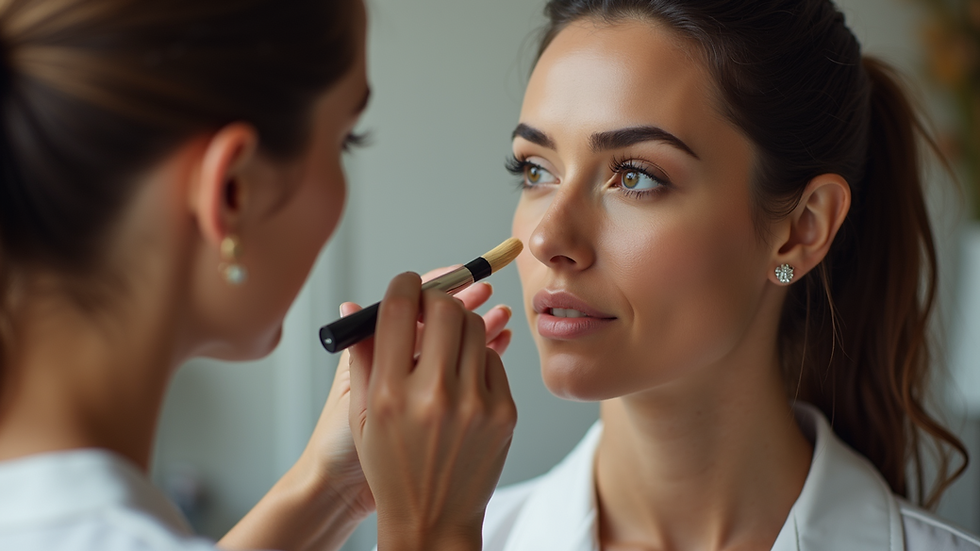The Importance of Earning a Beauty Certification
- Joyce Jade

- Oct 9, 2025
- 4 min read
Entering the beauty industry can be exciting and rewarding. However, to truly succeed and stand out, obtaining a professional certification is essential. A beauty certification not only validates your skills but also opens doors to numerous career opportunities. This article explores why earning a certification is crucial, what certifications are available, and how they can impact your career.
Understanding the Importance of Beauty Certification
Earning a certification in the beauty field is more than just a piece of paper. It represents your commitment to professionalism and mastery of your craft. Certified professionals are often preferred by employers and clients because they have proven their knowledge and skills through rigorous training and testing.
Why is certification important?
Credibility: Certification shows that you have met industry standards.
Trust: Clients feel more confident in your abilities.
Career advancement: Certified professionals often have access to better job opportunities and higher pay.
Legal compliance: In many regions, certification is required to legally perform certain beauty services.
By investing time and effort into obtaining a certification, you demonstrate dedication to your career and increase your chances of long-term success.

How Certification Enhances Your Skills and Knowledge
Certification programs provide structured learning that covers both theory and practical skills. This comprehensive education ensures you are well-prepared to handle various beauty treatments safely and effectively.
Key benefits of certification training include:
Up-to-date techniques: Learn the latest trends and methods in the beauty industry.
Safety protocols: Understand hygiene and safety standards to protect yourself and clients.
Business skills: Gain knowledge about client management, marketing, and running a beauty business.
Hands-on experience: Practice under supervision to build confidence and competence.
For example, a certified makeup artist will know how to select products suitable for different skin types and how to apply them flawlessly. This expertise can only be gained through formal training and certification.

What Certifications Should I Get for Cosmetology?
Choosing the right certification depends on your career goals and the services you want to offer. Here are some common certifications in cosmetology:
Licensed Cosmetologist: This is the foundational certification required to work in salons and spas. It covers hair cutting, coloring, skincare, and nail care.
Esthetician Certification: Focuses on skincare treatments such as facials, waxing, and makeup application.
Nail Technician Certification: Specializes in manicures, pedicures, and nail art.
Makeup Artist Certification: Concentrates on makeup techniques for various occasions, including bridal and theatrical makeup.
Advanced Certifications: These include specialized courses in microblading, lash extensions, or chemical peels.
Many beauty professionals choose to earn multiple certifications to expand their service offerings and increase their marketability.

How Certification Impacts Your Career Opportunities
Having a certification can significantly improve your career prospects. Employers and clients alike prefer professionals who have demonstrated their expertise through certification.
Career benefits include:
Higher earning potential: Certified professionals often command better salaries.
Job security: Certification can make you more competitive in the job market.
Networking opportunities: Certification programs often connect you with industry professionals and mentors.
Ability to start your own business: Certification is often required to open a salon or offer freelance services legally.
For instance, a certified esthetician can work in high-end spas, dermatology clinics, or even launch their own skincare line. Certification provides the foundation needed to pursue diverse career paths.
Tips for Choosing the Right Beauty Certification Program
Selecting the right certification program is crucial to your success. Here are some tips to help you make an informed decision:
Accreditation: Ensure the program is accredited by a recognized beauty or cosmetology board.
Curriculum: Look for comprehensive courses that cover both theory and practical skills.
Instructors: Choose programs with experienced and qualified instructors.
Flexibility: Consider programs that offer online or part-time options if you have other commitments.
Cost: Compare tuition fees and what is included in the price.
Reviews: Read testimonials from former students to gauge the program’s quality.
By carefully evaluating your options, you can select a program that fits your needs and helps you achieve your career goals.
Continuing Education and Staying Current in Beauty Trends
The beauty industry is constantly evolving, with new products, techniques, and trends emerging regularly. Certification is just the beginning of your professional journey. To stay relevant and competitive, ongoing education is essential.
Ways to continue learning:
Attend workshops and seminars.
Subscribe to industry magazines and blogs.
Participate in online courses and webinars.
Join professional beauty associations.
Practice new techniques regularly.
Continuing education not only enhances your skills but also shows clients that you are committed to providing the best and most current services.
Earning a beauty certification is a vital step for anyone serious about building a successful career in the beauty industry. It validates your skills, increases your credibility, and opens doors to exciting opportunities. Whether you want to work in a salon, start your own business, or specialize in a particular area, certification provides the foundation you need to thrive.
By investing in the right certification and committing to lifelong learning, you can ensure your career in beauty remains vibrant and rewarding for years to come.



Comments